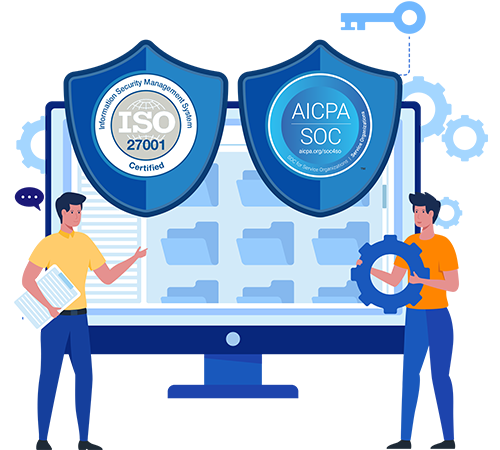
We want everything to go today – including enterprise-grade applications!
So, what are the Questions CIOs must ask? But before that, let us talk about modern work style.
Everything from work styles to the way we look at applications has changed drastically in the recent past. We now want everything to be integrated quickly so that we can use it anytime and anywhere. The digital era has indeed taken over – finally. Matching this demand is a plethora of low-code no-code solutions.
Today we have no-code and low-code solutions for every possible use case! However, the terms low-code and no-code are so widely used by vendors that they can sometimes simply refer to a specific application or solution that is simple to configure or extend. What questions must CIOs ask low-code no-code vendors to filter quality from the plethora of solutions? An inventory management application, for example, can be no-code or low-code if it allows for some extensibility beyond what is provided out of the box. This is not the same as purchasing a general-purpose low-code or no-code automation tool that can create a wide range of applications or solutions.
Low-code, no-code platforms are adopted by CIOs to accelerate digital transformation within their organizations. By leveraging these tools, companies can quickly develop and deploy applications without relying on traditional coding methods, allowing for faster time-to-market and increased agility.
Customers need to evaluate these tools not just against one application use case but against several potential options to ensure that they can grow with the needs of the enterprise.
And this creates a sticky wicket for the CIOs. This is a tough one, but we have the checklist!
To make the research and finalize the part easy for you, we have come up with a set of questions you can ask.
Questions CIOs must ask low-code no-code vendors
Let’s jump straight to them without further ado.
1. Can you build complex enterprise-level applications without coding?
This is of of the top questions CIOs must ask low-code no-code vendors.
This is a common doubt with no-code platforms. Most no-code platforms only offer basic and simple app development capabilities. If you need enterprise-level application support, does the vendor offer it? Or will that require additional coding?
A few advanced no-code platforms have built-in advanced features in their platform. With these features, business users can now build complex enterprise-grade applications without writing any code. Make sure your selection has a tick against this criterion !!
2. Can the business users use the platform to build the applications? Or will I need professional developers?

No-code platforms allow business users to build applications without coding, while low-code platforms require professional developers to build applications.
It is critical to understand how business users can use the platform to meet their requirements.
3. How customizable is the platform?
Ask about the levels of customizability the apps developed on the platform will offer.
Can you change, edit, add, or remove steps in the workflow?
Will you be able to add or remove fields easily?
How fast can you do these customizations and deploy them for use?
Also, check on the possibility of white labeling if it’s important for you.
4. What are the integration capabilities of the platform?
This question will give you an insight into whether you can use open APIs to integrate seamlessly and if you can integrate the apps you develop on the platform with other apps on the platform or 3rd party systems. At the end of the day, you don’t want another piece of software working in a silo.
5. How secure is the platform?

This is another important one of the questions CIOs must ask low-code no-code vendors. There has been a lot of debate about application security in low-code and no-code app development. But, the best ones do not take this for granted and incorporate security controls at every step. So, make sure you ask the low-code, no-code vendors to go into the details. Ask about user authentication, secure data transmission, content privacy, user access control, encryption of data, and anti-theft measures. Check if their security controls are certified against ISO 27001 and SOC 2 standards.
It’s worth noting that with no-code tools, the possibility of introducing any new security vulnerabilities is minimized as the users cannot write any custom code, and the ready-to-use building blocks are already tested for any security threats. On the other hand, organizations need to be extremely careful when using low-code tools to avoid security vulnerabilities introduced by handwritten code.

6. Is the platform extendible?
It’s important to ensure that you will be able to extend any functionality built on the platform at any time. For example, if you have a Travel Request app built on the platform, you should be able to extend it to include the Trip Report and Travel Expense Reimbursement processes without any challenges. The extension may require integration with a third-party system, and the platform should enable this seamlessly. You also need to make sure you can make changes on the go. The no-code platform should be agile and adaptive, so you can adapt to the changing business environment. Also, you don’t want vendor lock-in.
7. How does deployment work?
How are applications deployed to production? Is there any testing environment?
Is there any downtime?
What are the options to revert to the previous version of the app if you wish to do that?
8. Where is the platform hosted?
Where will your data be stored?
Does the hosting provider have appropriate security controls in place? Is the hosting service ISO 27001 and SOC 2 compliant?
How is my private information handled? Can I access, edit, delete, or move it anytime?
9. How does the user access control work?
Does the platform restrict access to apps, reports, dashboards, and other functionality based on user privileges? Can dual authentication be enabled, if required?
Can we restrict access to the applications from certain IPs?
10. What does the customer support service entail?
Customer support must be much more than just tech support over the phone during fixed hours.
Are email and chat support available? Ask about SLAs as well.
The kind of customer support varies from one platform to the other. Be sure to lock the vendor that promises what you prefer.
11. Does the vendor offer analytics with the solution?

What kind of analytics can you expect, and how easy is the data to understand?
What kind of reports will you be able to create?
Will you be able to build reports yourself?
Will you be able to create dashboards with these reports?
Will reports provide drill-down functionality?
Will you be able to create PDF reports?
Also Read: Top 47 No-Code and Other Sales Tools to Boost Productivity, Efficiency, and Revenue
12. What is the pricing?
Business leaders must ask how the power of low-code no-code Is it easy to understand and estimate how much your organization will spend over a period of time? Or is it confusing without a clear indication on how much you may end up spending?
How does it compare to the competition?
Will you be able to switch plans at any time?
Are there any discounts when your usage increases?
Is there any lock-in period?
What is the refund policy?
13. Is training provided?
Even if it is easy to use, a new application needs some training. Does the vendor provide that? If yes, is it operational, installation, administrative, or all? What is the medium of training? Will it be on-site or only remote?
14. Does it support only the build phase or the entire life cycle?
The vendor must be able to provide solutions that you can use not only in the build phase but also in design, testing, deployment, maintenance, etc.
15. Can they share references?
References are the best way to know whether the vendor is trustworthy. Ask for references without fail.
Conclusion
The best vendors will carefully listen to your needs and deliver what you request. These are questions CIOs must ask low-code no-code vendors will help you evaluate them thoroughly and find the right fit. While this is a general checklist, you can add or remove questions based on your specific needs.
Ready to transform your business? Get started now and experience the power of automation and app creation, all without the need for coding skills.
Login
Please login to comment
0 Comments
Oldest















